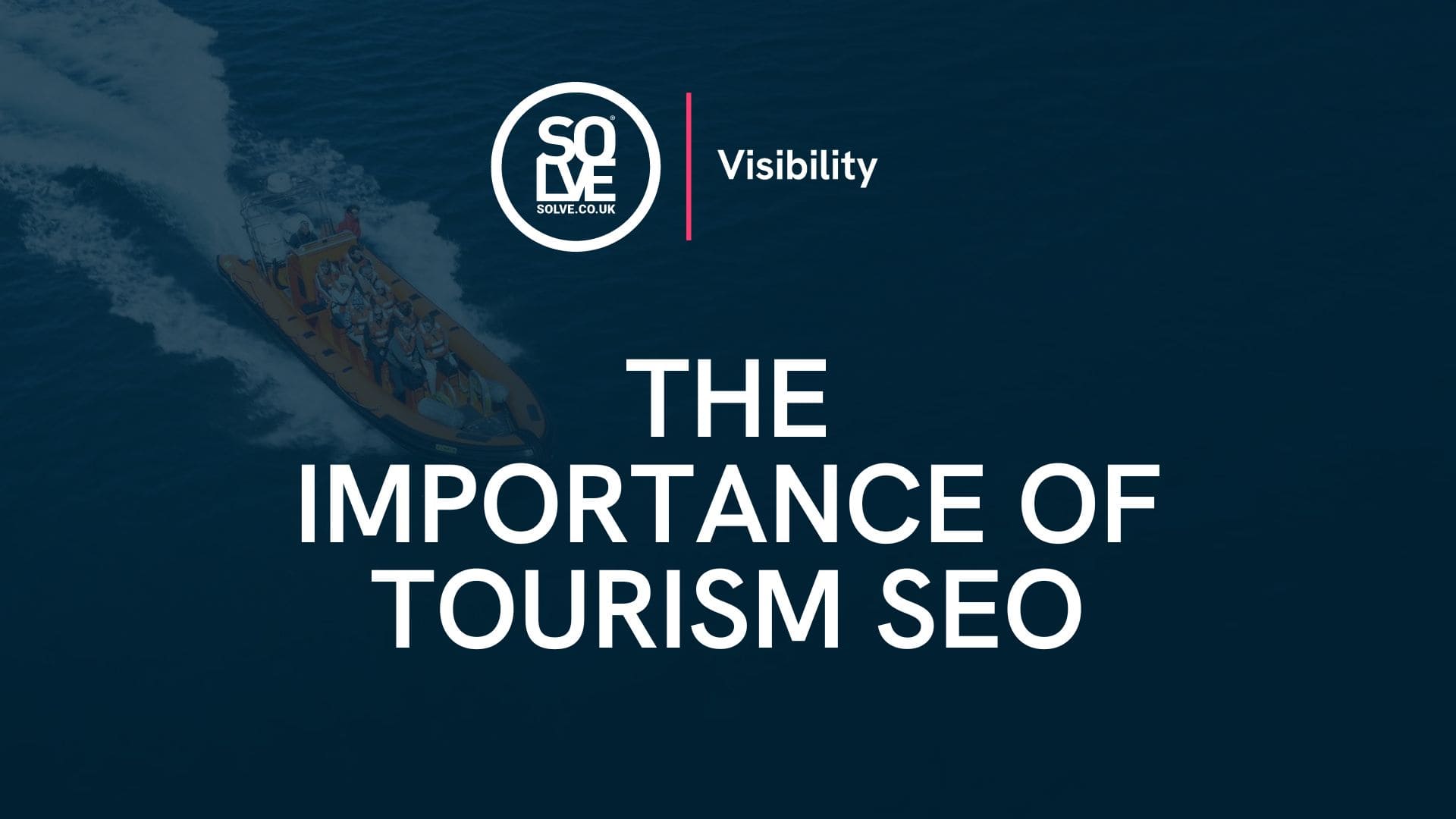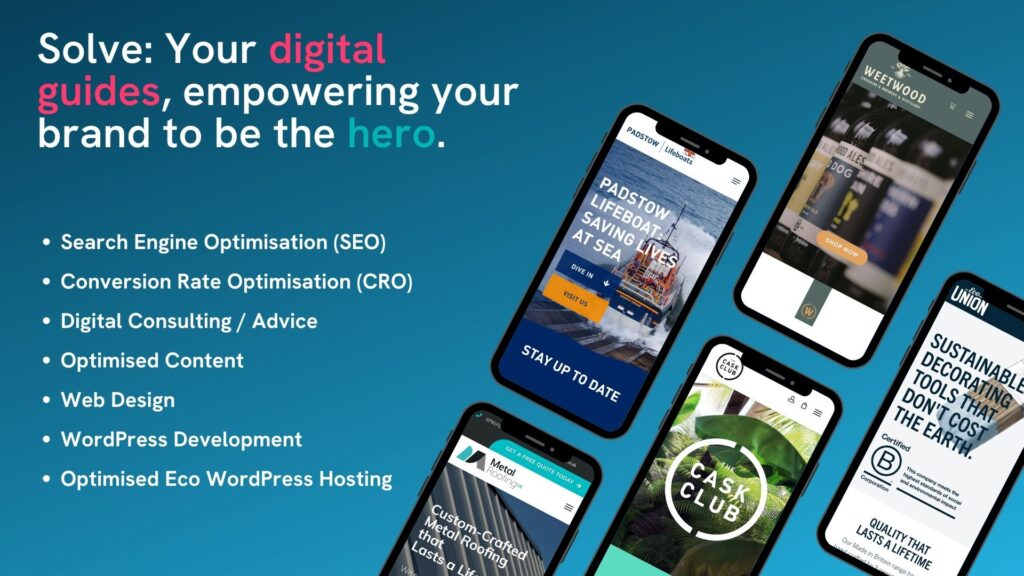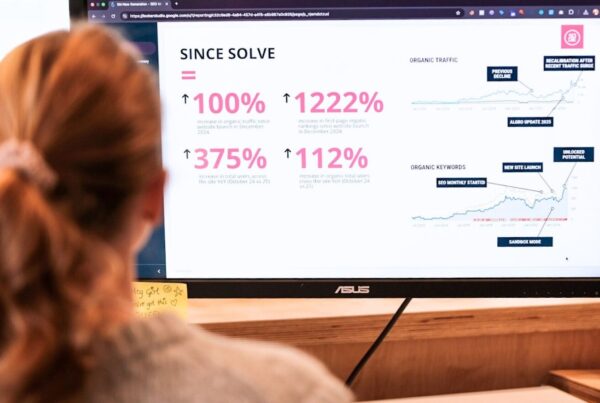
In today’s hyper-connected world, the tourism industry stands at the forefront of global economic activity. Whether it’s an enchanting destination, a luxurious hotel, or an adventurous tour, travellers increasingly turn to the Internet to plan their journeys. In fact, data from Statista suggests that 69% of all tourism and travel sales in 2023 will be made online worldwide, meaning your business could be missing over two-thirds of potential sales by not being discoverable online. As the competition intensifies, tourism businesses need to establish a robust and optimised online presence to thrive in this digital landscape and that’s where Tourism SEO can help.
The tourism industry requires a unique approach to SEO. Local SEO and video/image SEO take higher priority than they do in other industries. Additionally, it’s essential to recognise the diverse range of businesses within tourism, such as hotels and tour operators, each with unique considerations to address. In this article, we explore the importance of tourism SEO, how it differs for different business types, key strategy considerations, and how you can decide between in-house vs agencies for this work. So, whether you’re just starting out or looking to improve your existing tourism SEO, read on to learn how to get it right.

Table of Contents
What is Tourism SEO?
Many characteristics of tourism SEO overlap with regular SEO, such as keyword research, building backlinks, and optimising your images. When implemented effectively, a great tourism SEO strategy helps travel websites become more visible in search engine results pages (SERPs).
However, the tourism industry faces some unique challenges. For example, most users will use generic search terms to find holiday and travel information, rarely converting on the first visit because of high costs and the need to compare options. This means there are a lot of potential keywords to target, and there will be additional SEO strategies required to get repeat visits.
If you are to build a tourism SEO strategy that meets seasonal demand and user intent whilst helping customers on their journey around your website, then you’ve got a good chance of retaining the interest of prospective customers and grabbing that all-important sale.

Our Definition of a Tourism Business
Tourism is a dynamic, multifaceted industry that revolves around providing services and experiences to travellers. The tourism industry encompasses a huge range of businesses, from hotels and resorts, to tour operators, travel agencies, airlines, restaurants, and attractions.
A successful tourism business needs to do more than just offer services and make profits. To lead the competition, it will need to understand the needs and preferences of travellers, adapt to changing trends, provide exceptional customer service, promote sustainable practices and stay up to date with the latest technologies.

What Makes Tourism SEO Unique?
The tourism industry requires a unique approach to SEO. Local SEO and video/image SEO take higher priority than they do in other industries so this should be the cornerstone of your tourism SEO strategy.
Another aspect that makes tourism SEO unique is the emphasis on location-based keywords. Travellers often search for specific destinations or attractions, so it’s crucial to optimise website content with relevant location-based keywords. For example, a hotel in New York City would want to rank highly for keywords like “hotels in NYC” or “accommodation in Manhattan.” This requires careful keyword research and strategic implementation to ensure that the website appears in search results when potential tourists are looking for information about a particular location.
Another distinctive feature of tourism SEO is the importance of content marketing. Travellers are looking for valuable and engaging content that informs and inspires them to book that trip or experience. By illustrating what you offer with attention-grabbing articles, informative blog posts, inspiring videos, and dreamy social media content, you can highlight the unique aspects of a destination.
By creating high-quality content that is properly optimised for search engines, tourism websites can attract more visitors and establish themselves as authoritative sources of information that customers can trust.
The Importance of Tourism SEO
The competition in the tourism industry is fierce. The aim of tourism SEO is to promote your business, provide value for your customers, and increase brand awareness. To remain ahead of the curve and to attract more customers, travel and tourism companies need to implement an effective tourism SEO strategy so they don’t get left behind. SEO also improves customer loyalty by ensuring your website is easier to use and more visually appealing.
SEO for Hotels and Accommodation
For hotels and accommodation websites, local SEO is paramount. Optimise your Google Business listing, include accurate location information on your website, and leverage location-based keywords in your online content and blog posts. Local SEO enhances your visibility for travellers searching for accommodations in your specific area, helping you stand out in a crowded marketplace.
Local landing pages should be carefully targeted for each city or area in which you operate. These carefully targeted pages will provide information about your services in the local area and help attract customers. Creating these pages enables you to target specific keywords related to each location and improve your search engine rankings.
Garnering good reviews from customers is a strong foundation of any SEO strategy for hotel and accommodation providers. The more satisfied guests you have, the better your reputation and the more likely new visitors are to book with you. Having good reviews not only signals trust to future clients, but Google will see you as an authority and raise your website up the search results accordingly, getting you seen online.
An online customer survey conducted by Trustpilot found that an overwhelming 88% of respondents said reviews played an important role in influencing their purchase and that they trust online reviews as much as a personal recommendation.
One of the best ways of generating reviews is via your Google Business Profile. When potential customers search for your accommodation, they’ll not only see your Business Profile, but they’ll also see Google Reviews from your past customers displayed next to your business profile in Maps and Search which gives them all the information they need in one place.
Gathering reviews anywhere and everywhere your customers might be looking for hotels and accommodation will serve you well when building an online presence. Using travel review platforms such as Tripadvisor, Trustpilot, Facebook Business and Expedia will ensure you get your excellent reputation seen where it counts. Responding to reviews, both positive and negative, demonstrates your commitment to guest satisfaction and positively influences both potential guests and search engines alike.

SEO for Travel Agencies
High-quality images are not only a must for enticing potential guests, but they can also make or break your tourism SEO strategy. Whilst high-quality images depicting the travel experiences you offer are vital to selling the dream to potential customers, it is also important to ensure that the images you use on your website contribute to optimum user experience, website performance and search ranking. This can be achieved through techniques like reducing image file size to optimise site load speed and adding relevant metadata needed for image search, including alt tags which are used by both search engines and visually impaired users.
Using brand-specific, aspirational images on your travel agency website can help guide users through the buying process, increase the amount of time users stay on the page, boost your brand authority and increase the shareability of your content. All of which will help your SEO.
Images don’t always have to be images in the classic sense of lust-worthy photos of golden beaches and sunsets. You can use (branded) graphs, charts, graphics, infographics, embed social media posts or even add GIFs. All of these will enrich your web pages and provide more content to rank in image search.

SEO for Attractions, Tours and Things to Do
Imagine keywords as the breadcrumbs leading travellers to the doorstep of your attraction or tour. When planning an effective SEO strategy for your tourism business, it’s important to first conduct thorough research to identify the keywords your potential guests are searching for.
Creating compelling, shareable blog posts and social media content will help to build your brand reputation, offering more opportunities to rank in the SERPs through keyword integration.
Engaging, informative, and relevant content not only captivates your audience but also signals to search engines that your website is a valuable resource. It’s important to strike a balance between optimisation and readability for a compelling user experience. From location-specific terms to amenities and unique selling points, you should integrate these keywords naturally into your website’s content, meta tags, and headings.
Regularly update your blog and website landing pages with content that answers common traveller questions, highlights local attractions, and showcases the unique experiences your tour or service offers.

Key Elements of Tourism SEO Strategy
In the dynamic world of digital marketing, SEO is the compass guiding travellers to your hotel’s doorstep. By understanding and implementing the principles of SEO, you not only enhance your online visibility but also create a user experience that captivates and converts Spotential guests. Invest time and effort into optimising your digital presence, and watch as your hotel ascends the ranks in the online realm. Remember, in the world of tourism SEO, the journey is just as important as the destination.
Give Local Some Love
Local SEO is your secret weapon to connect with tourists looking for their perfect destination. Claim your Google My Business listing, encourage reviews, and make sure your business details are accurate. This not only boosts your local search visibility but also enhances your credibility as a go-to spot in the area.
Speedy Sites Win the Race
In the breakneck competitive world of tourism, it’s vital that you optimise your site’s speed for a seamless user experience. A fast-loading site not only pleases impatient travellers and stops them from clicking away to a rival’s website, but also earns brownie points with search engines.
Boosting Backlinks
Think of backlinks as the global network connecting your site to the rest of the internet. High-quality backlinks from reputable travel blogs, directories, and influencers act like travel endorsements, boosting your site’s credibility. Build relationships, collaborate, and let your website become the talk of the digital town.
Mobile Matters
Google loves mobile-responsive sites, and so do your potential guests. In the era of on-the-go exploration, your website must be as mobile-friendly as a well-worn backpack. Ensure seamless navigation, fast load times, and a user-friendly experience across all devices. Your audience should feel like they’re jet-setting through your website, no matter the screen size.
Captivating Content
Engaging and relevant content isn’t just king; it’s the crowned ruler of the SEO kingdom. From vivid destination guides to insider tips and awe-inspiring visuals, make sure your content is a one-way ticket to wanderlust.
Keywords are King
SEO without keywords is like a passport without stamps – incomplete. Unearth the keywords that travellers are typing into search engines. Are they dreaming of “tropical beach getaways” or seeking “ski trips in Alaska”? Carefully use and optimise these golden keywords throughout your website, ensuring that search engines recognise your site as a top destination.
Righteous Reviews
Reviews are the diamonds in the rough of user-generated content. Travellers share their stories and provide authentic experiences which is a treasure trove for SEO. It adds relevant keywords, paints a compelling picture of what your business offers, and gives search engines fresh, dynamic content to index.
Common Tourism SEO Mistakes to Avoid
When you run a tourism business it’s vital that you adapt to the ever-changing landscape of the travel industry and react accordingly.
Don’t journey blindfolded into the digital unknown. Analysing your website’s performance and scrutinising the data regularly is key to understanding what works and what doesn’t for your website’s SEO. Use insights to fine-tune your tourism SEO strategy, identify popular content, and adapt to the ever-changing digital terrain.
The main mistake to avoid? Not optimising or considering SEO at all and just hopping people find you online. Every site needs some love and attention to make the most of what search results can offer.

Choosing Between In-House vs SEO Agency for Tourism SEO
Choosing whether to implement your ongoing tourism SEO strategy using an in-house team or outsourcing it to an agency specialising in SEO can be a tricky conundrum. Unless you’re a jack of all trades with limitless resources, it sometimes pays to ask for a helping hand. And this is especially important in the world of travel and tourism.
SEO is a multifaceted, ongoing marketing strategy with many strands. SEO agencies often have a team of specialists, each proficient in different aspects of SEO. This diversity of expertise ensures a comprehensive and holistic approach to your digital strategy.
Whilst you might have a skilled SEO expert in-house, a key advantage of using an SEO agency is the breadth and diversity of their collective knowledge. An SEO agency offers specialist SEO solutions and support. Often team members will be dedicated to specific optimisation elements like outreach, backlinks, keyword research, or content. They are skilled professionals with industry-leading experience, tools and expertise who work collaboratively to improve their clients’ ranking, conversion, and online sales.
Regularly reviewing and optimising your website is essential for improving the experience of your website visitors and keeping up with the ever-evolving search engine algorithms. SEO agencies can quickly adapt to the evolving needs of your tourism business and redivert their targeting accordingly.
Agencies work with a range of clients, gaining insights into various industries and market trends. This broad perspective can bring fresh and innovative ideas to your tourism SEO strategy and result in lucrative collaboration opportunities.
For many businesses, hiring an agency can be more cost-effective than maintaining a full in-house team. You pay for the services you need without the overhead of salaries and benefits.
To learn more about deciding between SEO in-house vs outsourcing, why not check out our handy blog.

Let us Solve Your Tourism SEO Issues
Here at Solve, we offer SEO packages to ensure your travel website has constant optimisation and attention to detail. We offer a tri-monthly strategy to ensure we keep in line with your business and marketing goals to get the most effective results. If you need help with supercharging your website to ensure healthy tourism SEO, get in touch and let us help shine a digital spotlight on your business.
Concluding Thoughts- The Importance of Tourism SEO
A well-crafted, finely-targeted tourism SEO strategy shouldn’t be complicated. If you follow the guidelines mentioned above, you should be able to attract new business while keeping existing customers loyal and coming back for more.
Don’t be put off by presuming tourism SEO is an onerous task. With the right support, you can introduce a few vital stages at a time and leave the technical side to an agency specialising in SEO. We are here to help and guide you through every step of the process so that your travel business gets the success it deserves!

Get help with Tourism SEO that will help propel your business to online success.
Speak to Anna – One of Our SEO Experts.
Tourism SEO FAQs
What is Tourism SEO?
Tourism SEO is the practice of optimising travel and tourism-related websites to rank higher in search engine results. This involves strategies like keyword research, content marketing, and local SEO, tailored to the unique needs of the tourism industry to attract more visitors.
Why is Tourism SEO Important?
With 70% of tourism and travel sales projected to be online by 2024, having a strong online presence is crucial. Tourism SEO helps businesses stand out in a competitive market, attracting more potential customers and increasing online visibility.
How Does Tourism SEO Differ from Regular SEO?
While it shares common elements with regular SEO, tourism SEO places a greater emphasis on local SEO, location-based keywords, and content marketing that appeals specifically to travellers’ interests and needs.
What Role Do Reviews Play in Tourism SEO?
Reviews significantly influence customer decisions and can improve a business’s search ranking. An overwhelming 88% of people trust online reviews as much as personal recommendations, highlighting the importance of managing your online reputation effectively.
How Important Are High-Quality Images in Tourism SEO?
Vital. High-quality, brand-specific images enhance user experience, website performance, and search rankings. They help sell the dream of travel and encourage users to spend more time on your website.
Should I Handle SEO In-House or Hire an Agency?
This depends on your resources and expertise. SEO agencies offer a breadth of experience and can provide a comprehensive approach to your digital strategy, potentially offering more cost-effective and innovative solutions.





